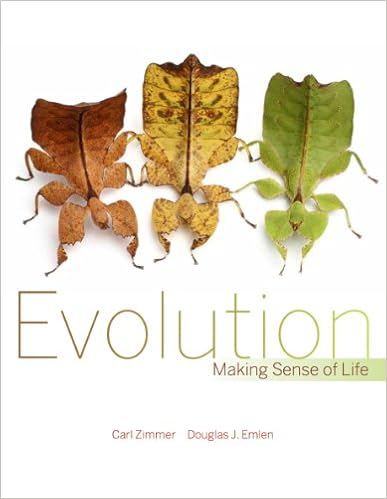 Re the excerpt from Evolution: Making sense of life by science writer Carl Zimmer and evolutionary biologist Doug Emlen (from 2012, hardcover valued at $80): In response to the offer noted here, the reader kindly writes to say,
Re the excerpt from Evolution: Making sense of life by science writer Carl Zimmer and evolutionary biologist Doug Emlen (from 2012, hardcover valued at $80): In response to the offer noted here, the reader kindly writes to say,
The free download is only the first part of the chapter, not the whole thing. Most of the discussion in this excerpt is about patterns in the fossil record (species diversity temporally and geographically, rates of origination and extinction, etc.)
Concerning possible mechanisms of macroevolution, the downloaded pages included this:
In Chapter 13 we saw how microevolutionary processes, such as natural selection and drift, can produce new species.
The only other references to possible mechanisms of macroevolution included “convergence” as an explanation for the similarity of Australian
marsupials to placental mammals on other continents; punctuated equilibria as an explanation for patterns in the fossil record; dispersal and plate tectonics as explanations for biogeographical patterns; and “evo-devo” as an explanation for the Cambrian explosion. But these references are all rather superficial; the main emphasis is on patterns in the fossil record.
So if “macroevolution” means that life had a history that is partially preserved in fossils, there’s some evidence here. But if “macroevolution” is supposed to mean how it happened, this excerpt is standard story-telling.
News’s response to friend: First, you are right re excerpt; it is not a whole chapter, as earlier reported, but pages 432 to 453 (Units 14.1 through 14.4), on macroevolution. Still free to interested readers, so far as we know.
Also, the function of standard Darwinian storytelling is often misunderstood. Insiders purse their lips at all those “just-so stories,” hoping perhaps that no one will guess their true role. (Maybe the insiders don’t understand it either.)
Because Darwinism (natural selection acting on random mutation generates huge levels of information, not noise) is assumed to be true (troo?), it is science irrespective of its fact base. All that any researcher or pop science writer needs is a Darwinian account of that fact base.
The critical controversy today is not between Darwin’s followers and the proponents of Noah’s ark. Rather, it is between a story of evolution where Darwinism explains almost everything about life vs. one in which a variety of mechanisms of change have operated throughout the history of life.
See, for example,
Horizontal gene transfer: Sorry, Darwin, it’s not your evolution any more
and
Epigenetic change: Lamarck, wake up, you’re wanted in the conference room!
In the present day, the burden of proof lies on the proponents of Darwinism—which in any other setting would be called “magic”—vs. the proponents of critical thinking. Only ruthless suppression of critics will save Darwinism from a long overdue accounting. But expect the Darwin lobby to continue to suppress and misrepresent the history of life unimpeded for quite a while yet.
Follow UD News at Twitter!